-
 Bitcoin
Bitcoin $82,824.9927
0.15% -
 Ethereum
Ethereum $1,812.0443
0.86% -
 Tether USDt
Tether USDt $0.9996
-0.01% -
 XRP
XRP $2.0531
1.26% -
 BNB
BNB $590.8048
0.24% -
 USDC
USDC $0.9999
0.00% -
 Solana
Solana $116.7059
-2.14% -
 Dogecoin
Dogecoin $0.1609
-2.09% -
 Cardano
Cardano $0.6477
0.87% -
 TRON
TRON $0.2377
1.97% -
 Toncoin
Toncoin $3.5900
-6.66% -
 UNUS SED LEO
UNUS SED LEO $9.4427
0.64% -
 Chainlink
Chainlink $12.8223
-0.83% -
 Stellar
Stellar $0.2611
1.72% -
 Avalanche
Avalanche $18.0751
0.35% -
 Sui
Sui $2.2399
-2.19% -
 Shiba Inu
Shiba Inu $0.0...01216
1.00% -
 Hedera
Hedera $0.1620
0.81% -
 Polkadot
Polkadot $4.0442
1.99% -
 Litecoin
Litecoin $83.2343
1.73% -
 MANTRA
MANTRA $6.4018
1.55% -
 Bitcoin Cash
Bitcoin Cash $299.5860
1.69% -
 Bitget Token
Bitget Token $4.4848
0.14% -
 Dai
Dai $1.0000
0.03% -
 Ethena USDe
Ethena USDe $0.9995
-0.03% -
 Monero
Monero $214.4863
0.12% -
 Hyperliquid
Hyperliquid $11.7593
-1.70% -
 Pi
Pi $0.5730
-12.73% -
 Uniswap
Uniswap $5.8248
-0.06% -
 Aptos
Aptos $5.0467
-0.83%
What are proof of work (PoW) and proof of stake (PoS)?
PoW, used by Bitcoin, requires solving complex puzzles, making it energy-intensive but secure; PoS, more eco-friendly, selects validators based on staked cryptocurrency.
Mar 28, 2025 at 09:00 am
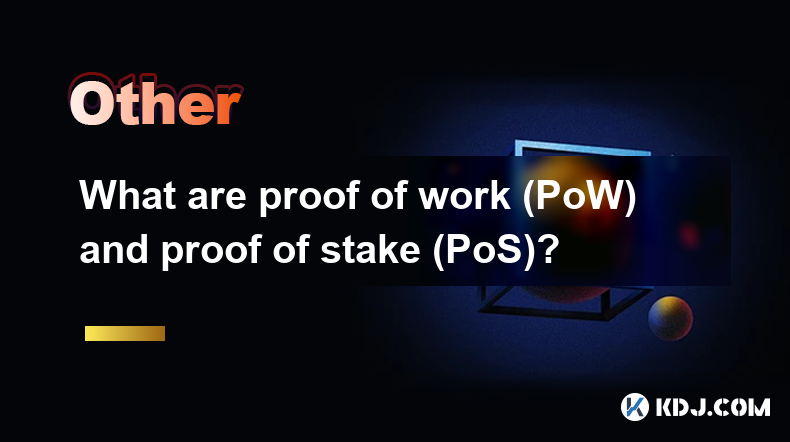
Understanding Proof-of-Work (PoW) and Proof-of-Stake (PoS) Consensus Mechanisms
Proof-of-Work (PoW) and Proof-of-Stake (PoS) are two fundamental consensus mechanisms used in blockchain technology to validate transactions and add new blocks to the blockchain. They represent different approaches to securing a decentralized network and achieving consensus among participants. Understanding their differences is crucial to comprehending the various cryptocurrencies and their underlying functionalities.
PoW, the mechanism used by Bitcoin, requires miners to solve complex computational puzzles. The first miner to solve the puzzle adds the next block of transactions to the blockchain and is rewarded with newly minted cryptocurrency. This process requires significant computing power, making it energy-intensive but also highly secure due to the difficulty of altering the blockchain's history. The more computing power dedicated to mining, the more secure the network becomes.
The energy consumption associated with PoW is a significant drawback. The computational power required translates to substantial electricity usage, raising environmental concerns. This has led to the exploration and adoption of alternative consensus mechanisms, such as PoS.
Proof-of-Stake (PoS), on the other hand, operates on a different principle. Instead of relying on computational power, PoS validators are selected based on the amount of cryptocurrency they "stake" or lock up in the network. The more cryptocurrency a validator stakes, the higher their chances of being selected to validate transactions and add blocks to the blockchain.
In PoS, validators are incentivized to act honestly because they risk losing their staked cryptocurrency if they attempt to validate fraudulent transactions. This mechanism is generally considered more energy-efficient than PoW as it doesn't require the same level of computational power. However, it can still be susceptible to attacks if a single validator controls a significant portion of the staked cryptocurrency.
Deep Dive into Proof-of-Work (PoW)
PoW's core function is to secure the blockchain by making it computationally expensive to alter past transactions. This is achieved through a cryptographic puzzle that miners compete to solve. The first miner to find the solution gets to add the next block and receives a reward.
- Miners invest in specialized hardware (ASICs) to maximize their chances of solving the puzzle.
- The difficulty of the puzzle adjusts automatically to maintain a consistent block generation time.
- The network's security is directly proportional to the total hashing power dedicated to mining.
- High energy consumption is a major criticism of PoW.
The process involves a continuous competition among miners. This competition ensures that no single entity can easily control the network and manipulate the blockchain. The reward mechanism incentivizes participation and maintains the security of the network. However, the energy consumption associated with this process remains a significant concern.
Understanding the Mechanics of Proof-of-Stake (PoS)
PoS offers a more energy-efficient alternative to PoW. Instead of relying on computational power, it uses a validator selection process based on the amount of cryptocurrency staked. This means validators need to lock up a certain amount of their cryptocurrency to participate in the validation process.
- Validators are chosen randomly, with the probability proportional to their stake.
- Selected validators propose and validate blocks, earning rewards for their services.
- PoS is generally considered more environmentally friendly than PoW.
- Validators are incentivized to act honestly to avoid losing their staked cryptocurrency.
The selection process ensures a degree of decentralization, preventing any single entity from dominating the network. The staking mechanism encourages long-term commitment to the network and participation in maintaining its security. However, the risk of "nothing-at-stake" attacks, where validators can easily switch their support without significant penalty, is a potential vulnerability.
Comparing PoW and PoS: Key Differences
The fundamental difference between PoW and PoS lies in how they achieve consensus and secure the blockchain. PoW relies on computational power, while PoS relies on staked cryptocurrency. This leads to significant differences in energy consumption, security characteristics, and potential vulnerabilities.
| Feature | Proof-of-Work (PoW) | Proof-of-Stake (PoS) |
|---|---|---|
| Consensus | Solving cryptographic puzzles | Random selection based on staked cryptocurrency |
| Security | High, due to computational cost | High, but potentially vulnerable to certain attacks |
| Energy Use | Very high | Much lower |
| Participation | Requires specialized hardware and significant energy | Requires holding and staking cryptocurrency |
| Scalability | Limited | Potentially higher |
While both mechanisms aim to secure the blockchain, they achieve this through different methods, each with its own strengths and weaknesses. The choice between PoW and PoS often depends on the specific goals and priorities of the cryptocurrency project.
Frequently Asked Questions
Q: Is PoS more secure than PoW?
A: Both PoW and PoS offer high levels of security, but through different mechanisms. PoW's security relies on the immense computational power required to attack the network. PoS's security relies on the economic incentive to act honestly, as validators risk losing their staked assets. Each has vulnerabilities; PoW is vulnerable to 51% attacks requiring massive computational power, while PoS is vulnerable to attacks exploiting the "nothing-at-stake" problem.
Q: Which is more energy-efficient, PoW or PoS?
A: PoS is significantly more energy-efficient than PoW. PoW requires vast amounts of electricity to power the mining hardware, while PoS only requires the energy to run the validator nodes, which is substantially less.
Q: Can I participate in PoS without owning a lot of cryptocurrency?
A: Some PoS systems allow for participation through "delegated staking," where you can delegate your cryptocurrency to a validator and earn rewards proportionally. However, the minimum amount required to stake directly can vary significantly between different PoS blockchains.
Q: What are the environmental implications of PoW?
A: The high energy consumption of PoW has significant environmental implications, contributing to greenhouse gas emissions and reliance on fossil fuels. This has led to increased scrutiny and a push towards more sustainable consensus mechanisms like PoS.
Q: What are the risks associated with PoS?
A: While PoS is generally considered more energy-efficient, it's not without risks. The "nothing-at-stake" problem, where validators can easily switch their support without significant penalty, is a potential vulnerability. Additionally, the concentration of staked cryptocurrency in the hands of a few large validators could pose a risk to decentralization.
Disclaimer:info@kdj.com
The information provided is not trading advice. kdj.com does not assume any responsibility for any investments made based on the information provided in this article. Cryptocurrencies are highly volatile and it is highly recommended that you invest with caution after thorough research!
If you believe that the content used on this website infringes your copyright, please contact us immediately (info@kdj.com) and we will delete it promptly.
- As SHIB and PEPE Holders Seek Stability, RCO Finance Emerges as a Hedge
- 2025-04-04 07:35:11
- Cango Sells Its China Operations for $351.94 Million, Pivoting Towards Cryptocurrency Mining
- 2025-04-04 07:35:11
- Cango Inc. Pivots to Bitcoin Mining, Exiting the Chinese Auto-Financing Market
- 2025-04-04 07:30:11
- Crypto analyst CasiTrades has provided a roadmap for the XRP price
- 2025-04-04 07:30:11
- In the world of AI and blockchain, where buzzwords often outpace actual innovation, Intellex stands apart
- 2025-04-04 07:25:13
- Stablecoins shifted their weight in Q1, flowing into a new set of chains
- 2025-04-04 07:25:13
Related knowledge

What are the future development trends of blockchain game development?
Apr 03,2025 at 05:00am
Blockchain technology has revolutionized various industries, and gaming is no exception. As we look to the future, several trends are set to shape the development of blockchain games. These trends not only promise to enhance the gaming experience but also to integrate blockchain technology more seamlessly into the gaming ecosystem. Let's explore these t...

What are the maintenance costs of blockchain system development?
Apr 03,2025 at 06:07pm
The maintenance costs of blockchain system development are multifaceted and depend on various factors. These costs can include technical maintenance, security updates, infrastructure expenses, and personnel costs. Understanding these elements is crucial for anyone planning to develop or maintain a blockchain system. Technical MaintenanceTechnical mainte...
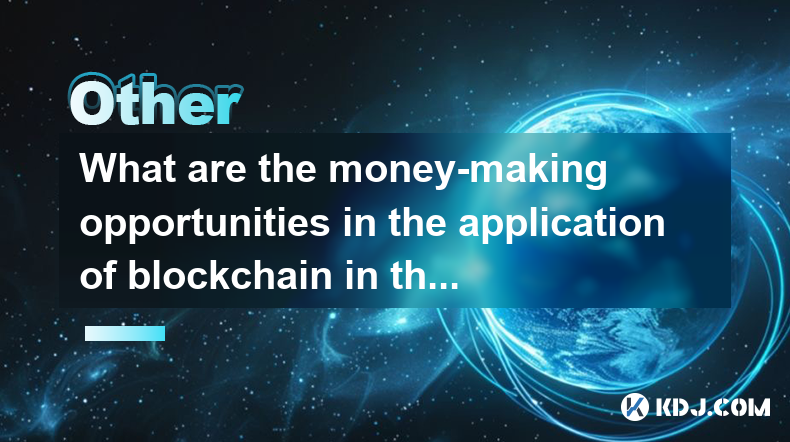
What are the money-making opportunities in the application of blockchain in the medical industry?
Apr 03,2025 at 03:35am
The integration of blockchain technology into the medical industry presents a myriad of money-making opportunities that can revolutionize healthcare systems. Blockchain's inherent characteristics, such as transparency, security, and immutability, make it an ideal solution for various medical applications. By leveraging blockchain, companies can develop ...
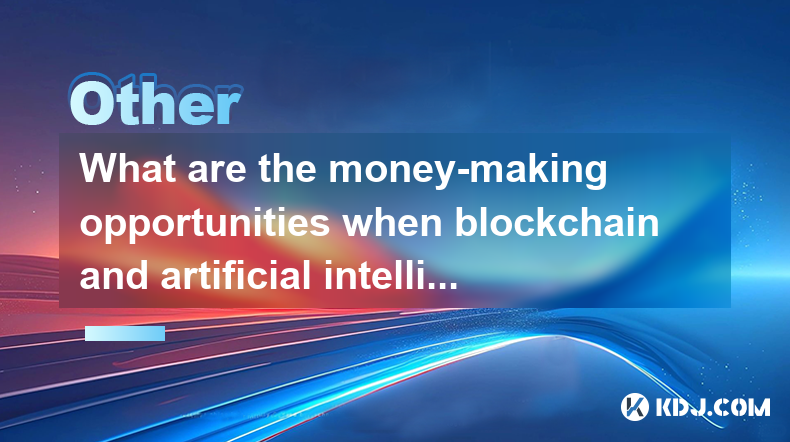
What are the money-making opportunities when blockchain and artificial intelligence are combined?
Apr 04,2025 at 01:28am
The convergence of blockchain and artificial intelligence (AI) presents a myriad of money-making opportunities within the cryptocurrency circle. This fusion leverages the decentralized and secure nature of blockchain with the analytical prowess of AI, creating innovative solutions and platforms that can generate significant revenue. From enhancing tradi...
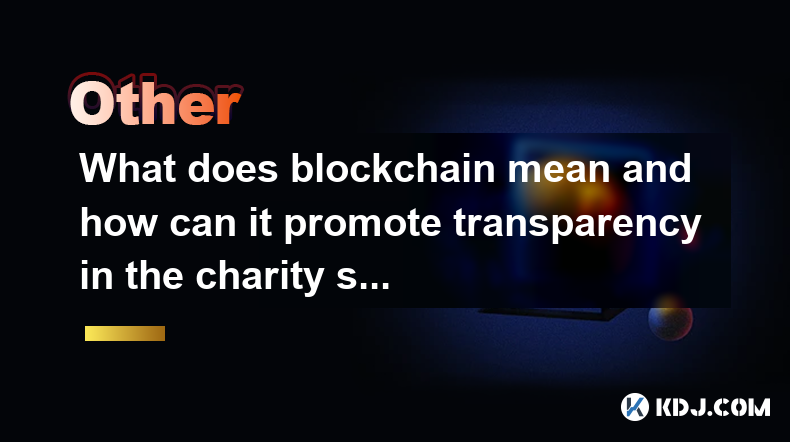
What does blockchain mean and how can it promote transparency in the charity sector?
Apr 03,2025 at 08:29pm
Blockchain technology is a decentralized, distributed ledger that records transactions across numerous computers. This ensures that the data is transparent and nearly impossible to alter retroactively. Essentially, blockchain serves as a digital ledger of all cryptocurrency transactions, enabling secure and direct exchanges without the need for intermed...
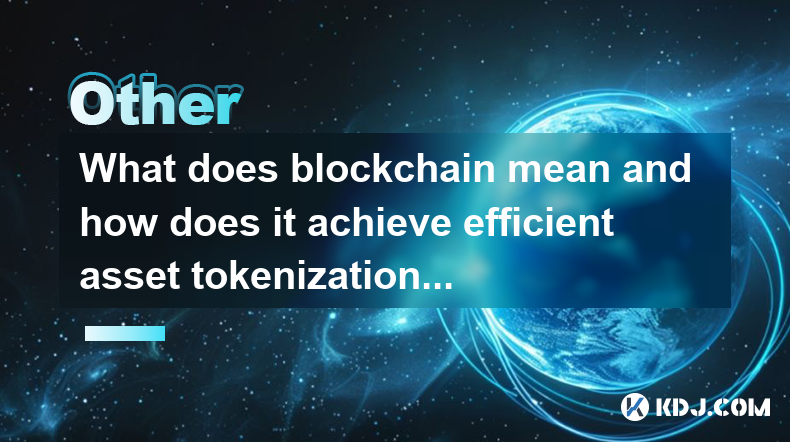
What does blockchain mean and how does it achieve efficient asset tokenization?
Apr 03,2025 at 07:57pm
Blockchain technology is a decentralized, distributed ledger that records transactions across numerous computers. It ensures that each transaction is secure, transparent, and immutable. The concept of blockchain was introduced with the launch of Bitcoin in 2009, but its applications have since expanded far beyond cryptocurrencies. At its core, blockchai...

What are the future development trends of blockchain game development?
Apr 03,2025 at 05:00am
Blockchain technology has revolutionized various industries, and gaming is no exception. As we look to the future, several trends are set to shape the development of blockchain games. These trends not only promise to enhance the gaming experience but also to integrate blockchain technology more seamlessly into the gaming ecosystem. Let's explore these t...

What are the maintenance costs of blockchain system development?
Apr 03,2025 at 06:07pm
The maintenance costs of blockchain system development are multifaceted and depend on various factors. These costs can include technical maintenance, security updates, infrastructure expenses, and personnel costs. Understanding these elements is crucial for anyone planning to develop or maintain a blockchain system. Technical MaintenanceTechnical mainte...

What are the money-making opportunities in the application of blockchain in the medical industry?
Apr 03,2025 at 03:35am
The integration of blockchain technology into the medical industry presents a myriad of money-making opportunities that can revolutionize healthcare systems. Blockchain's inherent characteristics, such as transparency, security, and immutability, make it an ideal solution for various medical applications. By leveraging blockchain, companies can develop ...

What are the money-making opportunities when blockchain and artificial intelligence are combined?
Apr 04,2025 at 01:28am
The convergence of blockchain and artificial intelligence (AI) presents a myriad of money-making opportunities within the cryptocurrency circle. This fusion leverages the decentralized and secure nature of blockchain with the analytical prowess of AI, creating innovative solutions and platforms that can generate significant revenue. From enhancing tradi...

What does blockchain mean and how can it promote transparency in the charity sector?
Apr 03,2025 at 08:29pm
Blockchain technology is a decentralized, distributed ledger that records transactions across numerous computers. This ensures that the data is transparent and nearly impossible to alter retroactively. Essentially, blockchain serves as a digital ledger of all cryptocurrency transactions, enabling secure and direct exchanges without the need for intermed...

What does blockchain mean and how does it achieve efficient asset tokenization?
Apr 03,2025 at 07:57pm
Blockchain technology is a decentralized, distributed ledger that records transactions across numerous computers. It ensures that each transaction is secure, transparent, and immutable. The concept of blockchain was introduced with the launch of Bitcoin in 2009, but its applications have since expanded far beyond cryptocurrencies. At its core, blockchai...
See all articles






















































































